Bed bug outbreak rocks Las Vegas: Four major hotels – including The Venetian and Mirage – report infections after guests were left covered in bites
Las Vegas is in the midst of a bed bug outbreak, with four of the largest hotels reporting blood-sucking bugs in recent months.
Late last summer, reports emerged of guests leaving Sin City covered in bites, prompting an investigation by the Southern Nevada Health District.
Officials found four hotels — including the Venetian and Mirage, which cost $1,200 a night, had suffered bed bug outbreaks over the past five months.
It comes as bed bug infestations are becoming more common after Paris was rocked by a bed bug last year and the bugs are also crawling around the London Underground.
Experts say the outbreaks may be caused by a harder-to-kill species – which has recently migrated north from tropical areas. In the US it has already been confirmed in Florida and Hawaii – although experts fear it may have traveled further north.
Above are the four Las Vegas hotels that reported bed bugs in the last five months
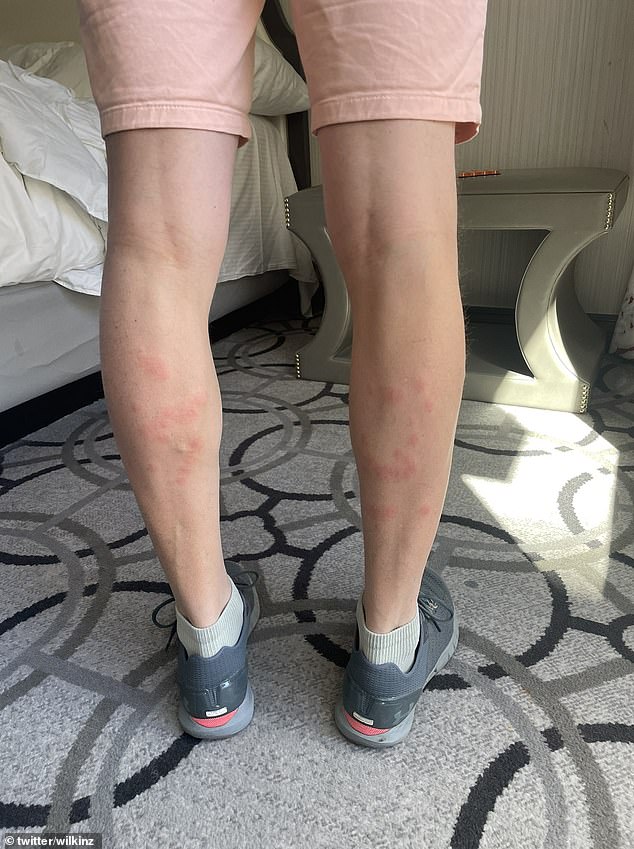
A guest @wilkinz posted photos of the aftermath of an encounter with unwanted roommates at Paris Las Vegas
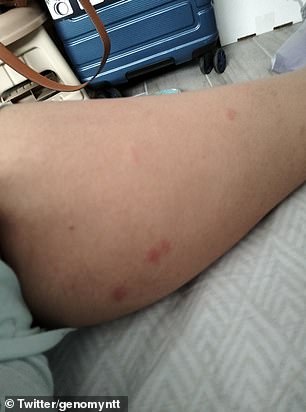
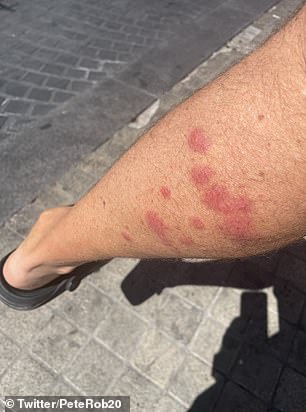
Bed bugs have become an almost routine risk for Las Vegas hotel guests, some claim, while Pete Rob (right) said he was only offered another room after the attack on him at the Horseshoe Hotel and Casino
The health department launched an investigation after receiving reports from citizens.
In their initial investigation, revealed in the documents, officials contacted the Venetian after receiving a report of bed bugs in their hotel.
The Venetians confirmed that a guest had been moved to another suite and had all his clothes washed after reporting bed bugs in their room.
Pest control experts were also called who found bed bugs and treated the room with insecticides. It was opened to the public five days after the bedbugs were first discovered.
In October, a guest staying at The Mirage also reported bed bugs to local health officials, saying they had been bitten during their stay.
Their complaint stated: “Hello, I just returned from a stay at The Mirage in Las Vegas where I was bitten by bed bugs.
“The hotel inspected the room, confirmed the presence of the insects and refunded my money.”
An inspection report found that pest control experts found the insects hiding in the bed frame and quickly killed them with insecticides.
In December, inspectors also received a complaint from a guest staying at Encore who said she found bed bugs in her room.

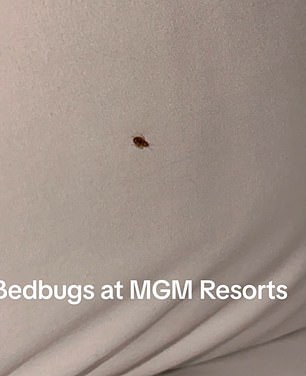
Do you think the right is a cockroach? Can delete. Above are images of bed bugs at two major Las Vegas resorts posted to social media
The hotel quickly sent a bedbug sniffer dog, which found one live insect, the report said.
The room was treated with insecticides by the staff.
And the Excalibur Hotel and Casino received two bed bug complaints in December and January.
In the January complaint, the person wrote, “I found bed bugs in my hotel room. I filed a claim with the hotel management and they conducted an investigation. They emailed me that their inspection…returned positive results for bed bugs.”
And before the complaint in December, someone claimed they were left with “bites everywhere” when they returned home.
In both cases, the rooms were examined by officials and cleared of bed bugs.
The Nevada Resort Association said in a statement: “The minimal number of incidents reflects the extensive and proactive health and safety measures and pest control procedures Las Vegas resorts have in place to prevent and address issues.
‘Unfortunately, these pests can be carried anywhere unnoticed in luggage and clothing.’
They added: ‘Although it is incredibly rare, when reported, our members take swift action in accordance with health and safety requirements.’
It was not clear how the insects entered the rooms, but Las Vegas welcomes more than 38.8 million people every year – both from within and outside the US.
With the number of pests increasing worldwide, this increases the risk of guests arriving with the insects – possibly hitching a ride on their clothing – which then infest the rooms.
Furious guests have previously taken to social media to report infections in their rooms in Las Vegas.
Among them was an unnamed person staying at the Paris Vegas who posted photos online of bedbug bites on their legs.
“Had the worst stay at the Paris Vegas Hotel,” they wrote.
‘The room was full of dust and made me allergic on the first night. Then my roommate got bitten by bed bugs!
“The hotel didn’t give any compensation or anything!”
Another video from 2022 shows bed bugs running around the floor at the Circus Circus hotel in Las Vegas.
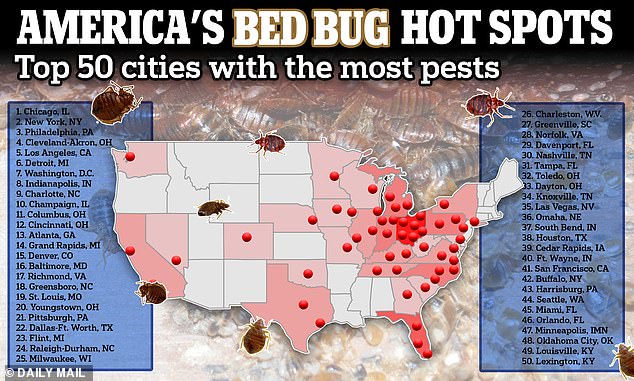
Residents of Chicago, New York, and Philadelphia should inspect their mattresses as experts report their cities will rank first, second, and third in bed bugs in 2023. The new findings are based on economic data from both residential and commercial bed bug treatments.
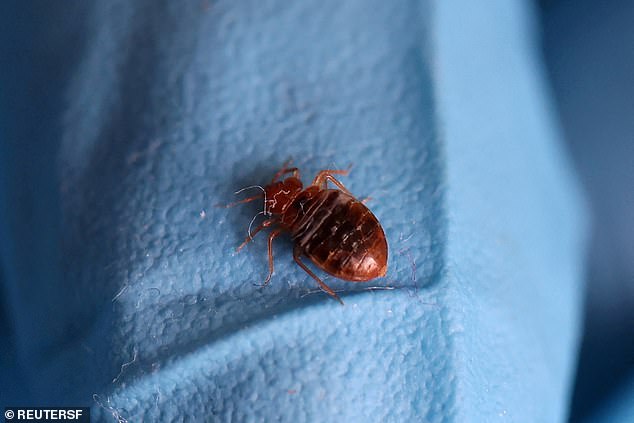
Bed bugs are not disease carriers, but if you are bitten by a bed bug, it will leave itchy red welts on the skin, similar to poison ivy
Over the past two years, bed bugs have been reported in seven different hotels in Las Vegas.
Circus Circus, which was completing a three-year renovation, reported two plagues within six months in 2022, the data showed.
And Caesar’s Palace, where rooms can cost up to $40,000 a night, also fell victim to the unwanted guests, along with Planet Hollywood, Palazzo, Tropicana, the MGM Grand and Sahara.
Bed bugs are small insects that can grow up to half an inch in length.
During the day, they can hide in corners and crevices in rooms, including plugs, under the bed and small gaps in the headboard.
But at night they emerge, attracted by the heat of human bodies, and suck the blood of the guests.
The insects can leave large, red bumps on people’s skin, indicating where they have bitten someone – often in a row.
In more severe cases they can cause skin infections and there are concerns that, like mosquitoes, they can transmit infectious diseases – although this is rarely reported.
Pests are notoriously difficult to treat because the insects have become resistant to most insecticides used.
This is often because they have evolved to have a thicker armor that the chemicals cannot penetrate.
